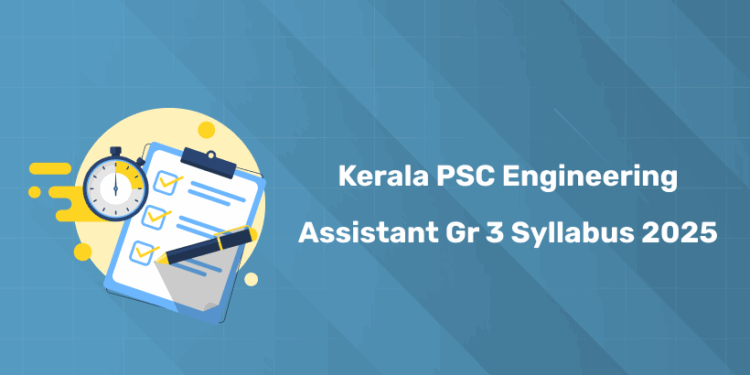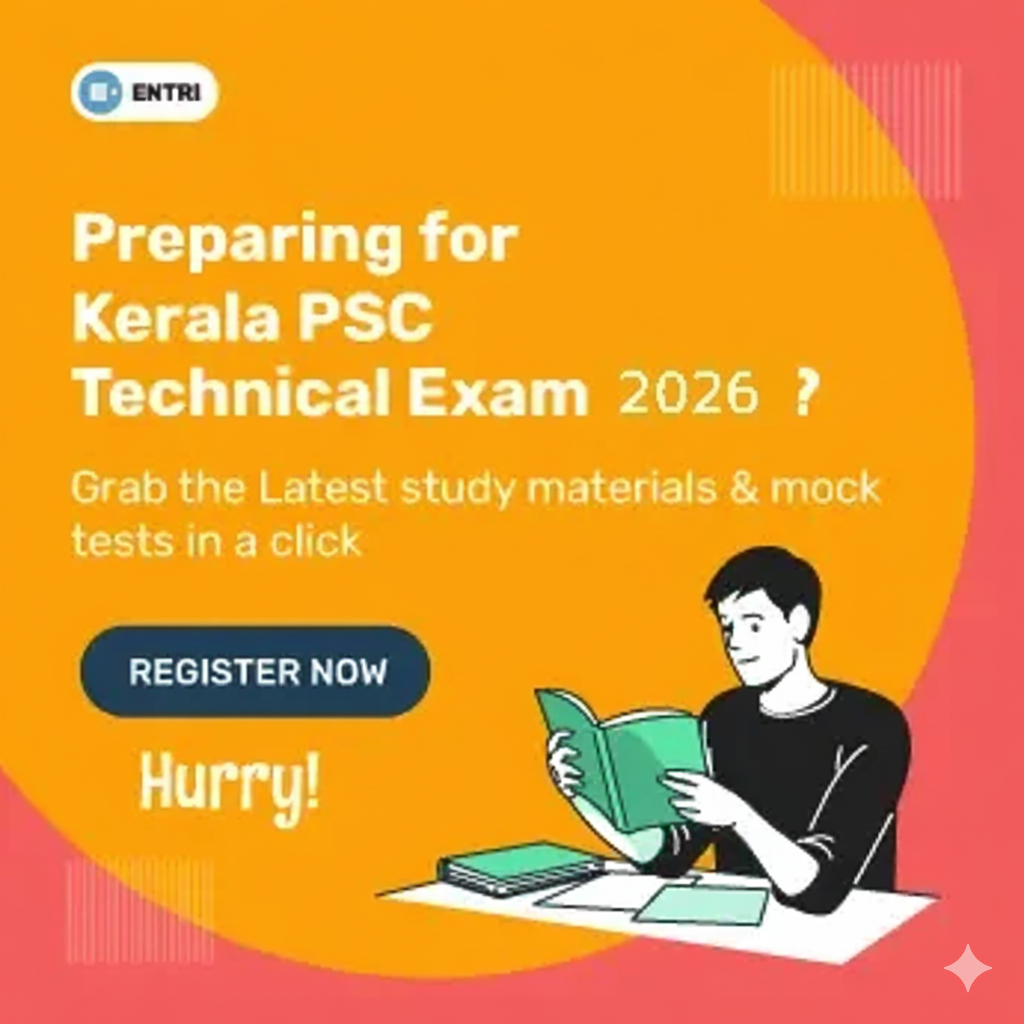Table of Contents
The Kerala Public Service Commission has released the notification for Engineering Assistant Grade 3 in the Kerala State Construction Corporation Ltd. The written exam will consist of 100 objective-type questions based on the prescribed curriculum. In this blog, we will cover the detailed Kerala PSC Engineering Assistant Grade 3 Syllabus and Exam pattern 2025.
KERALA PSC TECHNICAL EXAM COACHING
Kerala PSC Engineering Assistant Grade 3 Notification 2025 Highlights
| Event | Details |
|---|---|
| Recruiting Organization | Kerala Public Service Commission (KPSC) |
| Department | Kerala State Construction Corporation Ltd |
| Post Name | Engineering Assistant Gr III |
| Category Number | 223/2025 |
| Pay Scale | ₹ 9,190 – 15,780 /- |
| Vacancies | SC/ST – 01 (One) ST only – 02 (Two) |
| Exam Date | January 12, 2026 |
| Admit Card | December 29, 2025 |
| Shortlist | Notify Later |
| Result Date | Notify Later |
| Official Webiste | www.keralapsc.gov.in |
Kerala PSC Engineering Assistant Grade 3 Syllabus 2025 PDF
1: Between the period of 1858-1947, how many Viceroys ruled over India?
For the convenience of candidates, the detailed syllabus for the Kerala PSC Engineering Assistant Grade 3 Exam 2025 has been provided in the official notification. Aspirants can download the complete syllabus PDF from the link below.
| Topic | Engineering Assistant Syllabus PDF |
|---|---|
| 223/2025 | |
| 362/2025 |
Prepare for Kerala PSC Technical Exams with Entri
സർക്കാർ ജോലി എന്ന സ്വപ്നം ഇനി സ്വപ്നം മാത്രമല്ല! Join Kerala's Top-rated PSC Coaching Programs
Join NowKerala PSC Engineering Assistant Grade 3 Exam Pattern 2025
The Kerala PSC Engineering Assistant Grade 3 exam will be an objective-type test conducted in English medium. The key highlights are:
- Total Questions: 100
- Total Marks: 100
- Marks per Question: 1
- Negative Marking: 0.33 marks deducted for each wrong answer
- Duration: 75 minutes
The exam syllabus is based on the Engineering discipline, with questions distributed across all core subjects. The major areas include:
| Module No | Module Name | Marks |
|---|---|---|
| 1 | Basic Engineering Drawing | 8 |
| 2 | Building Materials and Construction | 12 |
| 3 | Building Construction | 20 |
| 4 | Building Drawing and Estimating | 12 |
| 5 | Irrigation Engineering | 6 |
| 6 | Surveying | 14 |
| 7 | AutoCAD | 8 |
| 8 | Units of Measurements and Applied Mechanics | 6 |
| 9 | Transportation Engineering | 8 |
| 10 | Public Health and Sanitation | 6 |
Kerala PSC Engineering Assistant Grade 3 Previous Question Papers – Free PDF
| Year | Previous Question Paper Link |
| 2016 | |
| 2015 | |
| 2019 | |
| 2014 | |
| 2021 |
Kerala PSC Engineering Assistant Grade 3 Syllabus 2025 – Detailed
The Kerala PSC Engineering Assistant Grade 3 Exam will be conducted based on the prescribed pattern and topics, with 100 objective-type questions. Below is the detailed syllabus to guide candidates in their preparation.
MODULE 1: BASIC ENGINEERING DRAWING (8 marks)
Drawing instruments, uses, layout of drawing sheet, types of lines, lettering, dimensioning, types of scales, plane geometrical construction, conic sections, projection.
MODULE 2: BUILDING MATERIALS AND CONSTRUCTION (12 marks)
Properties of engineering materials, building stones, bricks, lime, timber, tiles, sand, cement, mortar and concrete, admixtures, ferrous metals, non-ferrous metals, glass, protective materials.
MODULE 3: BUILDING CONSTRUCTION (20 marks)
Stone masonry, brick masonry, composite masonry, foundation, bearing capacity of soil, scaffolding, shoring and underpinning, damp proofing, waterproofing and termite proofing, arches, lintels, stairs, RCC – introduction, uses, materials, proportions, formwork including bending of bars and construction reference of BIS code, RCC lintel, column, slab, beam, footings, method of mixing concrete, slump test. Steel structures – common forms of steel sections, tension and compression members, types of riveted joints, welded joints, doors and windows, roofs, floors and floorings.
MODULE 4: BUILDING DRAWING AND ESTIMATING (12 marks)
Building rules and bye-laws, provision of safety for buildings, types of estimate, sanctions, rules and methods of measurement of works, rate analysis, labour, materials, schedule of rates, valuation – terms.
MODULE 5: IRRIGATION ENGINEERING (6 marks)
Terms used in irrigation, water requirements of crops, weirs and barrages, storage and diversion headworks, reservoirs, dams, canals, cross drainage works, hydroelectric projects and turbines.
MODULE 6: SURVEYING (14 marks)
Chain surveying – principles, instruments used, field book plotting; compass surveying; plane table surveying; levelling and contouring; curves; theodolite – area and volume calculation. Introduction to total station, types of total station, measurement with total station, characteristics and features of total station, global positioning systems.
MODULE 7: AutoCAD (8 marks)
Introduction, basic commands, toolbars, function keys and shortcut keys, 2D drafting, 3D modelling – shortcut keys, knowledge of layout and printing drawings.
MODULE 8: UNITS OF MEASUREMENTS AND APPLIED MECHANICS (6 marks)
Units of measurements, simple machines, work, power, energy, simple stress, strain, mensuration, simple trigonometry.
MODULE 9: TRANSPORTATION ENGINEERING (8 marks)
Roads, development of roads, general principles of alignment, classification and construction of different types of roads; railway engineering – types of rail sections, permanent way, sleepers, ballast, fixtures and fastenings, creep, screw spikes, washers, rail sections, signalling, points and crossings; bridge engineering – foundation of bridges, superstructure of bridges, and classification of bridges.
MODULE 10: PUBLIC HEALTH AND SANITATION (6 marks)
Pipes and pipe joints for underground drainage, quality of water, sources of water, treatment and conveyance of water, distribution of water, systems of sanitation, house drainage, collection and conveyance of sewage, septic tank, water and sewage treatment plant, sewer appurtenances, wastewater disposal.
Prepare for Kerala PSC Technical Exams with Entri
സർക്കാർ ജോലി എന്ന സ്വപ്നം ഇനി സ്വപ്നം മാത്രമല്ല! Join Kerala's Top-rated PSC Coaching Programs
Join NowHow to Download Kerala PSC Engineering Assistant Gr 3 Syllabus 2025
- Visit the official Kerala PSC website – www.keralapsc.gov.in.
- On the homepage, go to the “Recruitments” section.
- Click on “Syllabus” from the dropdown menu.
- Select “Downloads” option.
- Search for Engineering Assistant Grade 3 (Kerala State Construction Corporation Ltd.).
- Click on the syllabus link and download the PDF for future reference.











